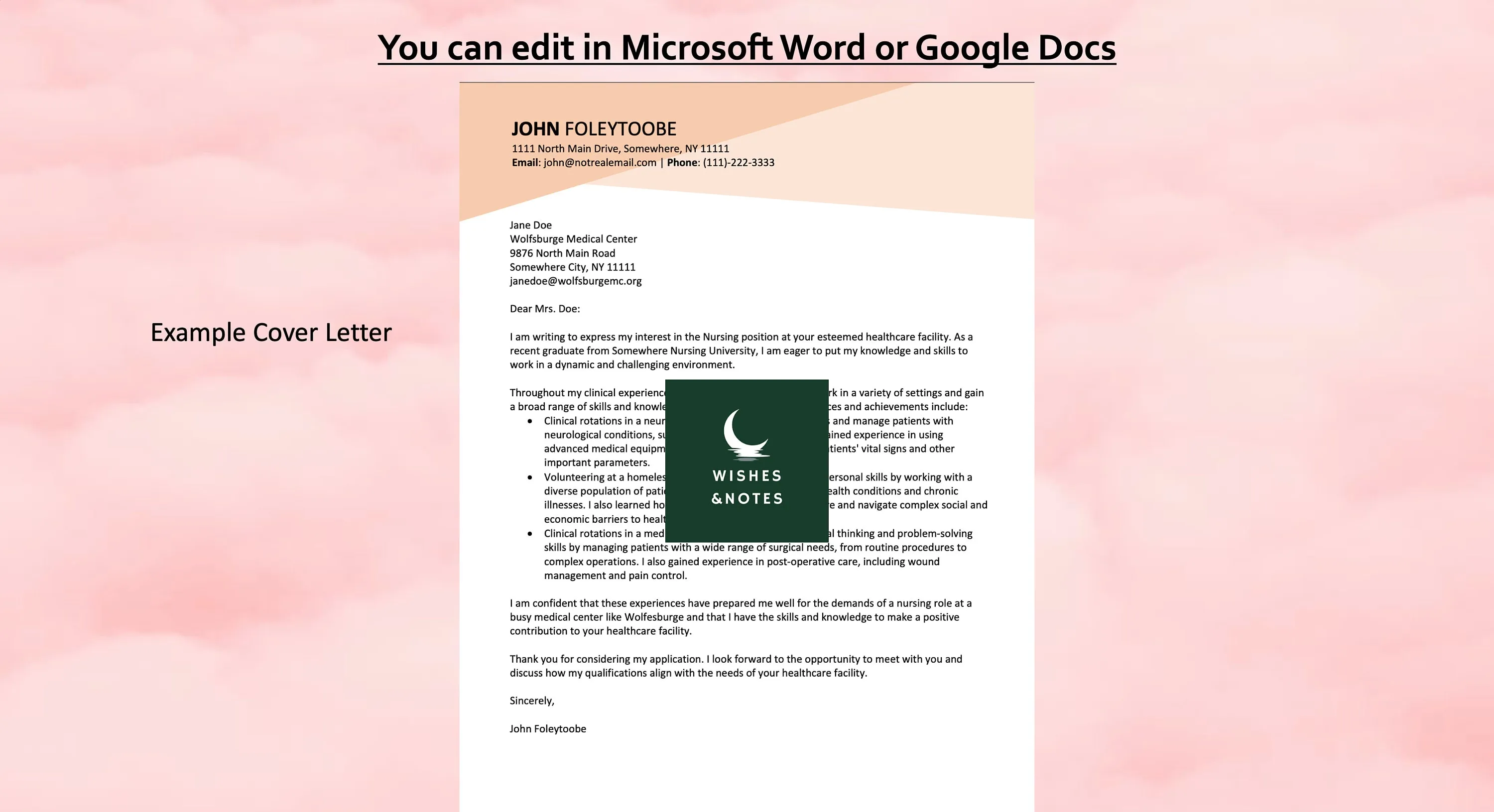Why a Nurse Cover Letter is Essential for New Grads
As a new graduate nurse, the job market can seem daunting. Standing out from the crowd is crucial, and that’s where a compelling cover letter comes in. Unlike experienced nurses who can rely heavily on their clinical experience, new grads often have limited professional history. A well-crafted cover letter gives you the opportunity to showcase your personality, passion for nursing, and potential to the hiring manager. It’s a chance to connect with the reader on a personal level and demonstrate that you’re more than just a resume. Moreover, it provides a platform to explain any gaps in your experience or highlight relevant experiences like clinical rotations or volunteer work. A strong cover letter demonstrates professionalism, attention to detail, and your commitment to securing the position. Ignoring this crucial document can significantly decrease your chances of getting an interview.
Highlight Your Skills
Your cover letter should be a skills-focused narrative, not just a reiteration of your resume. The goal is to connect your skills with the job’s requirements. Make sure to read the job description carefully and identify the key skills the employer is looking for. Then, provide concrete examples from your clinical rotations, volunteer work, or academic projects that demonstrate your abilities. For example, if the job description mentions a need for strong communication skills, provide an instance where you successfully communicated complex medical information to a patient or their family. Using the STAR method (Situation, Task, Action, Result) is helpful to illustrate your skills effectively. This method allows you to explain the situation, your task in that situation, the actions you took, and the positive results of your actions. This approach gives the reader a clear understanding of your capabilities.
Transferable Skills
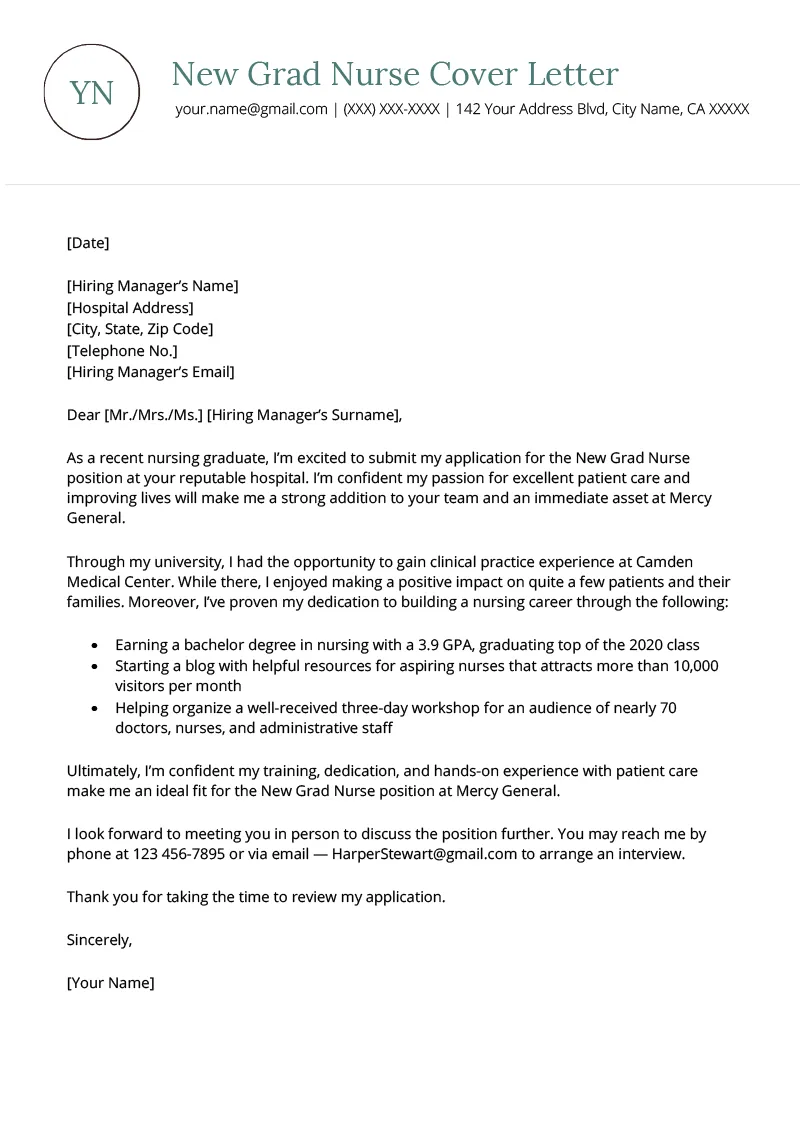
Even without extensive clinical experience, you possess valuable transferable skills that are highly sought after in nursing. These include communication, teamwork, problem-solving, critical thinking, and time management. During your clinical rotations, you’ve likely had to collaborate with doctors, therapists, and other nurses. Highlight these instances, emphasizing your ability to work effectively as part of a multidisciplinary team. Similarly, provide examples where you had to solve a patient’s problem or improve the efficiency of care. Show how you demonstrated critical thinking in assessing patient conditions, making decisions, and providing appropriate care. Also, time management is crucial in nursing. Illustrate your ability to prioritize tasks, manage your time effectively, and handle stressful situations, such as a busy shift during your clinical rotations.
Clinical Skills
Clinical skills are the foundation of a nurse’s practice. When discussing your clinical skills, be specific and provide evidence of your proficiency. Describe the types of patients you’ve cared for, the procedures you’ve performed, and the equipment you’ve used. For instance, you might state, “During my rotation in the ICU, I gained experience in monitoring vital signs, administering medications, and assisting with intubation and central line insertion.” Quantify your experiences whenever possible. Instead of saying “I assisted with many patient care,” state “I cared for an average of 6-8 patients per shift and administered medications to more than 20 patients daily”. Be sure to incorporate relevant keywords from the job description. Demonstrating your clinical skills is a must, but equally important is your ability to apply these skills in a safe, ethical, and compassionate manner.
Tailor Your Cover Letter
A generic cover letter sent to multiple employers rarely impresses. Take the time to personalize each cover letter for the specific job and the healthcare facility. Customization demonstrates that you’ve done your research and are genuinely interested in the position. If you are applying for a role at a specific hospital, mention aspects of that hospital that appeal to you. It might be their focus on patient care, their commitment to research, or their reputation in the community. This personal touch makes your application stand out. Highlighting specific skills or experiences that align with the job requirements shows the hiring manager that you understand their needs and that you’re a good fit for the role. Always remember to address the letter to the hiring manager or the appropriate person. If you cannot find a name, contact the HR department to find out. Never address the cover letter to “To Whom It May Concern.”
Research the Hospital or Clinic
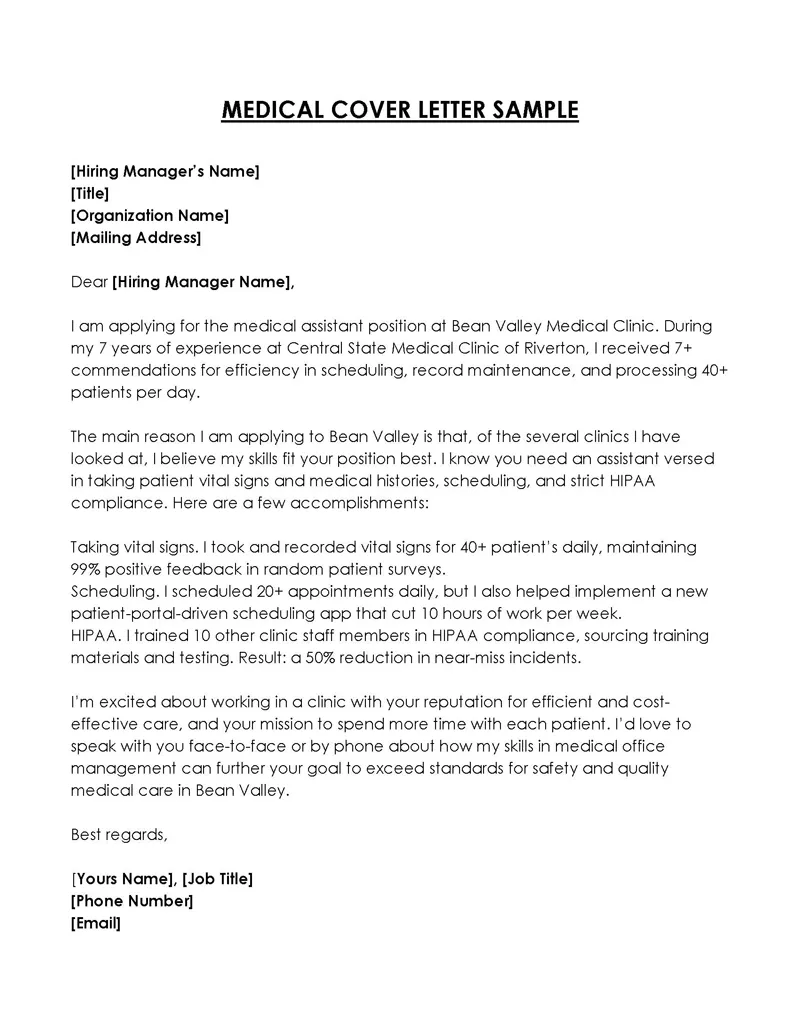
Before you begin writing, thoroughly research the hospital or clinic. Visit their website, read their mission statement, and explore their recent achievements. This research will provide valuable insights into the organization’s values, priorities, and culture. Understand the services they provide, their approach to patient care, and any special programs they offer. If the hospital has a specific focus, such as a cancer center or a cardiac unit, mention how your skills and interests align with that focus. This shows that you’ve taken the initiative to learn about the organization and demonstrates your genuine interest in the position. Additionally, you can often find information about the hiring manager or the nursing department on the hospital’s website or LinkedIn. Addressing your cover letter to the person in charge is another step to showing your interest in working there.
Address the Specific Job Requirements
Carefully review the job description and address each of the requirements in your cover letter. The job description is a roadmap of the employer’s expectations. Identify the key qualifications, skills, and experience the employer is looking for and provide evidence that you meet these requirements. Instead of simply listing your skills, explain how your skills align with the job’s demands and how you’ve used those skills effectively in previous roles. If the job description lists specific software or equipment, mention your experience with them. Tailor the language you use to match the language in the job description. This ensures that your cover letter is easily understood by the reader and also makes it clear that you’ve taken the time to understand the employer’s needs. This targeted approach improves your chances of getting noticed.
Showcase Your Passion and Enthusiasm
Nursing is a demanding profession, and hiring managers want to see that you’re passionate about the field. Your cover letter is a chance to showcase your enthusiasm for nursing and your dedication to providing excellent patient care. Share why you chose nursing and what motivates you to pursue this career. Highlight the aspects of nursing that you find most rewarding, such as making a difference in patients’ lives or working in a collaborative environment. Let your personality shine through and be genuine. Your passion for nursing should be evident throughout your cover letter, from your opening statement to your closing remarks. Authenticity can make you memorable and increase your chances of landing an interview. Think about a time when you were able to make a difference for your patient or a time where you were most fulfilled. This will allow you to translate your passion for nursing effectively.
Explain Your Motivation
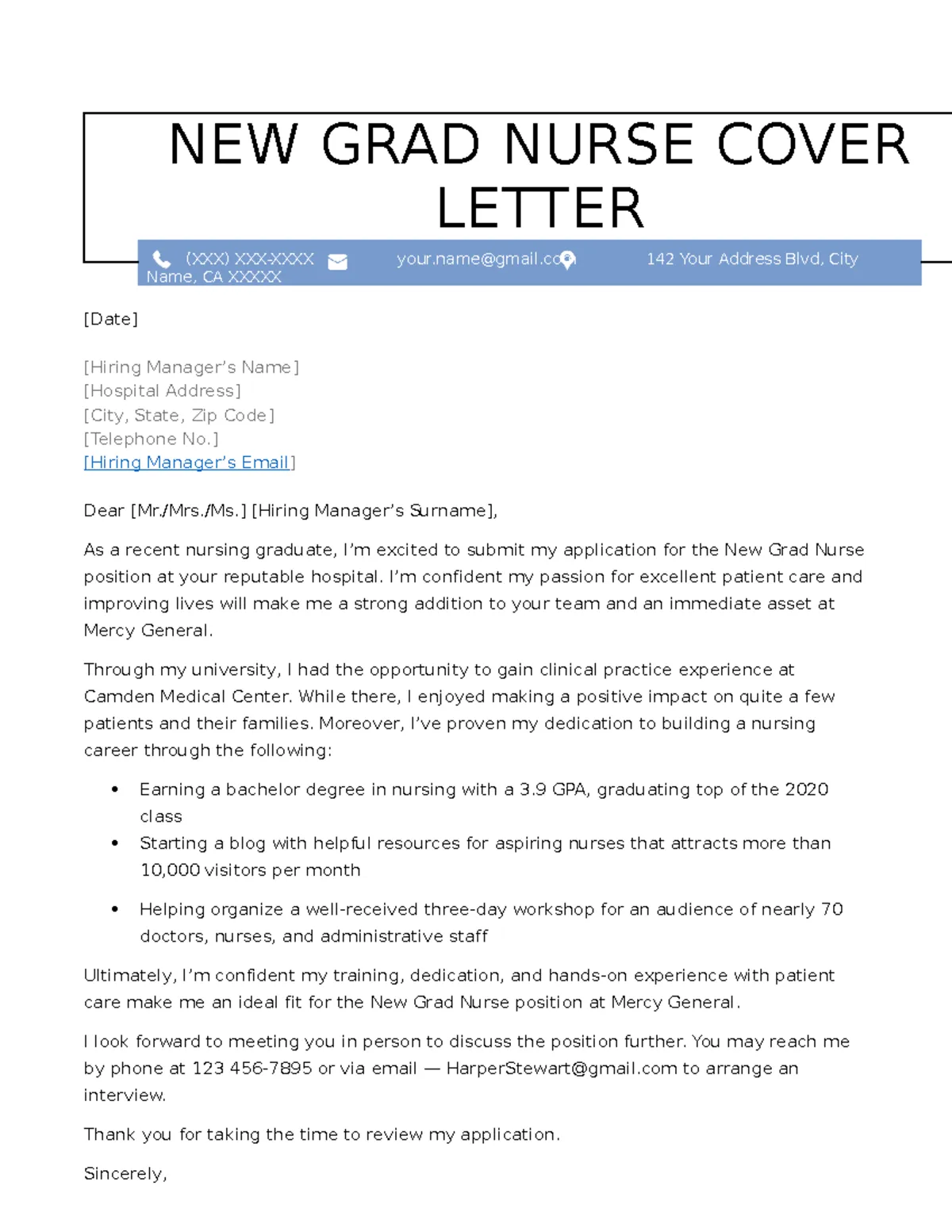
Explain what motivates you and why you want to work for this specific hospital or clinic. Are you drawn to their commitment to patient-centered care, their innovative approach to healthcare, or their supportive work environment? Be specific about your reasons. Sharing your goals and aspirations can also make your cover letter more compelling. Discuss your long-term career goals, what you hope to achieve as a nurse, and how this position aligns with your ambitions. Express your enthusiasm for the position and the opportunity to contribute to the team. This shows that you are not just looking for a job, but a career. Demonstrating your motivation not only enhances your application but also helps to build a solid foundation for a successful career.
Demonstrate Your Patient Care Philosophy
Your approach to patient care is a crucial aspect of your nursing philosophy. Briefly describe your patient care philosophy in your cover letter. Discuss your beliefs about patient-centered care, your commitment to patient advocacy, and your approach to building relationships with patients. Showcase how you prioritize patient comfort, safety, and well-being. Illustrate your ability to communicate effectively with patients and their families, provide emotional support, and advocate for their needs. Discuss your understanding of cultural sensitivity and your ability to provide care to diverse populations. You can also add information about your commitment to patient education. This will clearly show your desire to create a safe and comfortable environment for your patients.
Proofread and Edit
Before sending your cover letter, proofread and edit it meticulously. Ensure that your cover letter is free of grammatical errors, spelling mistakes, and typos. Errors in your cover letter reflect a lack of attention to detail, which can raise concerns for a hiring manager. Ask a friend, professor, or career counselor to review your cover letter and provide feedback. This second set of eyes can help identify mistakes and suggest improvements. Always use spell-check and grammar-check tools, but don’t solely rely on them; they don’t always catch all errors. The cover letter is an extension of your professional identity, and ensuring it is polished will significantly enhance your application.
Check Grammar and Spelling
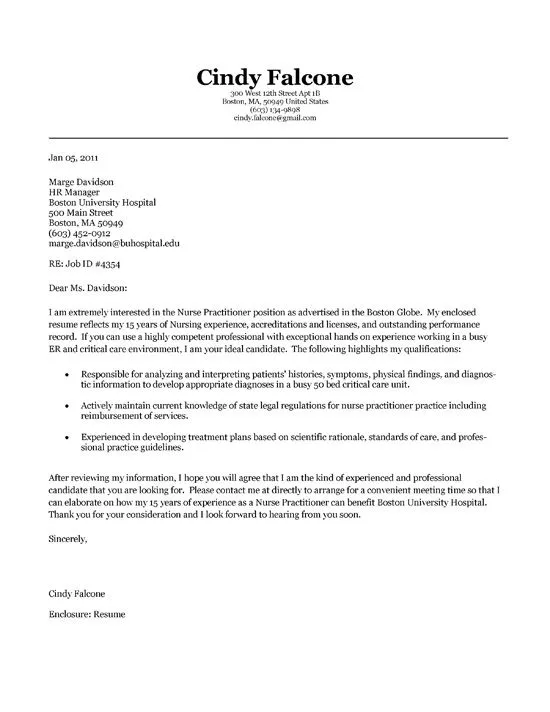
Proofreading your cover letter for grammar and spelling errors is crucial. Run the document through a grammar checker and spell checker, but manually review each suggestion. Incorrect grammar and spelling errors can distract the reader and undermine your credibility. Pay attention to punctuation, capitalization, and sentence structure. Incorrect grammar and spelling errors create a negative impression of your attention to detail and professionalism. Ensure that all the words and sentences are clear and concise, so that the reader can easily comprehend the message you are conveying. Also, double-check any names, titles, and specific details to ensure they are accurate. Small errors show a lack of care and attention, so it’s important to proofread to make sure everything is perfect.
Formatting and Structure
The formatting and structure of your cover letter significantly impact its readability and the impression it creates. Use a clear and easy-to-read font, such as Times New Roman or Arial. Maintain consistent formatting throughout the document, including font size, spacing, and margins. Proper formatting contributes to a professional appearance and makes it easier for the reader to follow your content. Organize the information in a logical and concise manner. Use clear headings, subheadings, and bullet points to break up large blocks of text and enhance readability. Keep each paragraph brief and focused. Avoid long paragraphs that can be overwhelming. When writing the letter, use professional language and a respectful tone. Maintain a positive attitude and make sure that your cover letter accurately reflects your skills and experience. Ensure that your contact information is clearly visible, so the reader can easily reach you.
Closing with a Strong Call to Action
End your cover letter with a strong closing statement that leaves a positive and lasting impression. Express your interest in an interview and reiterate your enthusiasm for the position. Make it clear that you are eager to discuss your qualifications further and contribute to their team. Indicate your availability for an interview and the best way to contact you. Thank the reader for their time and consideration. A strong closing statement shows confidence, professionalism, and your eagerness to move to the next step of the application process. In the closing, you can add a note saying you look forward to hearing from them soon. This will encourage them to take action to move forward with the interview process.
Express Gratitude
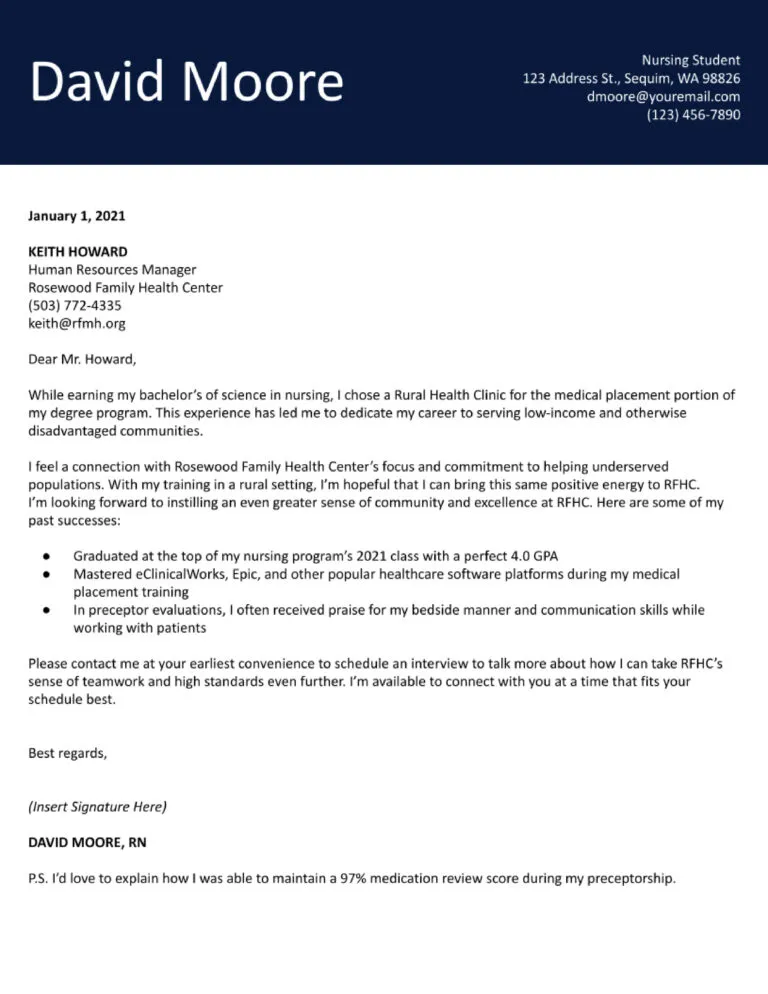
Always express your gratitude to the hiring manager for their time and consideration. Thank them for reviewing your application and expressing your appreciation for the opportunity. Showing gratitude is a sign of professionalism and respect. Also, reiterating your enthusiasm for the role and the opportunity to contribute to their team. The closing of your cover letter should be professional and appreciative. You can also mention your willingness to provide additional information or answer any questions they may have. This final step leaves a positive impression and shows your genuine interest and professionalism. The goal is to create a positive impression and encourage the hiring manager to want to meet you.
Include Contact Information
Make sure to include your contact information at the end of your cover letter. Include your full name, phone number, and email address. Make sure your email address is professional. Avoid using casual or informal email addresses. Consider adding your LinkedIn profile URL, if you have one. Include the address of the place you will live. You need to make it easy for the hiring manager to reach you, so make sure all the information is correct and up to date. Including your contact information at the end makes it easier for the hiring manager to contact you, which is another way to make sure your letter is well-received.
